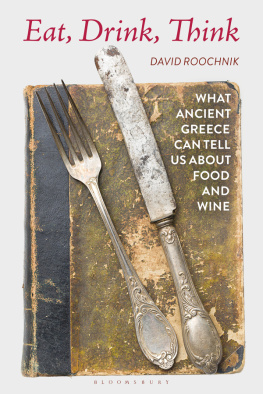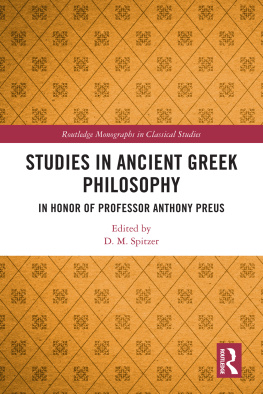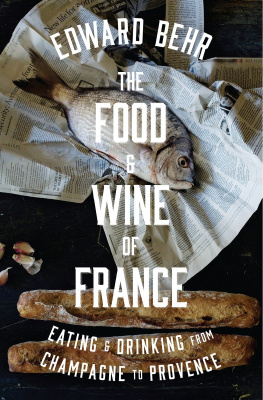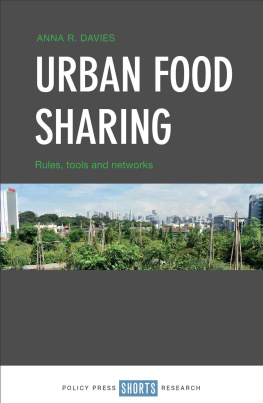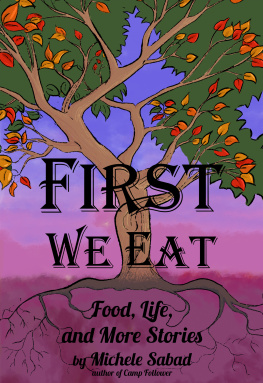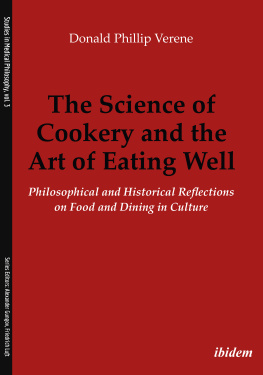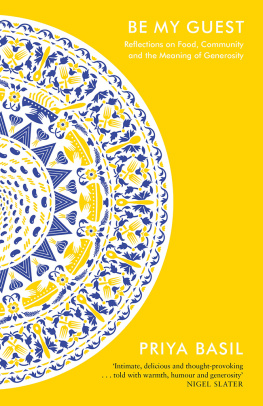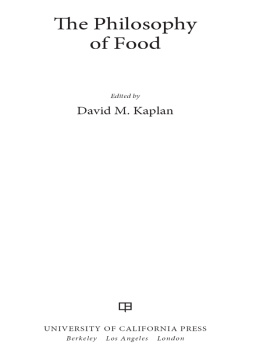
Eat, Drink, Think
Eat, Drink, Think
What Ancient Greece Can Tell Us about Food and Wine
David Roochnik

BLOOMSBURY ACADEMIC
Bloomsbury Publishing Plc
50 Bedford Square, London, WC1B 3DP, UK
1385 Broadway, New York, NY 10018, USA
BLOOMSBURY, BLOOMSBURY ACADEMIC and the Diana logo are trademarks of Bloomsbury Publishing Plc
First published in Great Britain 2020
Copyright David Roochnik, 2020
David Roochnik has asserted his right under the Copyright, Designs and Patents Act, 1988, to be identified as Author of this work.
For legal purposes the constitute an extension of this copyright page.
Cover image (@ HERA FOOD / Alamy Stock Photo)
All rights reserved. No part of this publication may be reproduced or transmitted in any form or by any means, electronic or mechanical, including photocopying, recording, or any information storage or retrieval system, without prior permission in writing from the publishers.
Bloomsbury Publishing Plc does not have any control over, or responsibility for, any third-party websites referred to or in this book. All internet addresses given in this book were correct at the time of going to press. The author and publisher regret any inconvenience caused if addresses have changed or sites have ceased to exist, but can accept no responsibility for any such changes.
A catalogue record for this book is available from the British Library.
A catalog record for this book is available from the Library of Congress.
ISBN: HB: 978-1-3501-2076-1
PB: 978-1-3501-2077-8
ePDF: 978-1-3501-2078-5
ePub: 978-1-3501-2079-2
To find out more about our authors and books visit www.bloomsbury.com and sign up for our newsletters.
Also available from Bloomsbury
The Emergence of National Food , edited by Atsuko Ichijo, Venetia Johannes, and Ronald Ranta
Introducing the Sociology of Food and Eating , Anne Murcott
Taste, Politics, and Identities in Mexican Food , edited by Steffan Igor Ayora-Diaz
Dedicated to Gina, Alfredo, and Alessandra, who taught me to eat well.
Come, well shake off this mourning mood of ours and think of supper.
Homer, Odyssey IV.229
Surely you dont think that a philosopher cares much about such so-called pleasures as those of food and drink?
Plato, Phaedo , 64d
Contents
The author is grateful to the following sources for permission to reproduce in this book material previously published elsewhere:
Excerpts from THE ODYSSEY by Homer, translated by Robert Fitzgerald. Copyright 1961, 1963 by Robert Fitzgerald. Copy renewed 1989 by Benedict R. C. Fitzgerald, on behalf of the Fitzgerald children. Reprinted by permission of Farrar, Straus and Giroux.
Excerpts from THE BACCHAE by Euripides, translated by William Arrowsmith. Copyright 1959 by the University of Chicago. Published 1959. Paperback edition 1968. Reprinted by permission of the University of Chicago Press.
(1)
The food, as usual in my home, is simple and lovely. Fresh scallops bought from Cindy, a woman who goes to the docks every day, and then sells her goods at a local store in Coolidge Corner. Fresh asparagus from the farmers market at Copley Square. Its spring in Boston, theyre in season, and well be eating them every day until they disappear from the stalls. I marinate both in olive oil and then throw them on a hot grill. While theyre cooking, and it doesnt take long, I finish up the pasta. In the pan, some cherry tomatoes (industrial), lots of garlic, and tiny flakes of dried habanero chilies, just enough to add an almost imperceptible sting, sizzle in oil. I throw in a modest pat of butter. When the spaghetti is almost done, I take it out of the boiling water, drain it vigorously, and dump it into the pan, where I mix it thoroughly in the sauce. Then I sprinkle with finishing oil, a really nice one from Tuscany. Outlandishly expensive, but the large bottle will last for months. The hot pan goes to the table for serving, and then the scallops and asparagus, both browned nicely, come to the plates. A warm evening, were sitting on our deck, chilled white wine in our glasses. I pause for the briefest moment. Then, imitating my Italian friends, I say buon appetito to Gina, who returns the greeting, and only then do we begin to eat. A bite of scallop comes first. Its rich, succulent, sweet.
And then, as almost always, especially at home, and especially when its just me and Gina, I eat too fast. Having taken a long swim earlier, Im hungry. I wolf down the food. It all tastes wonderful. Oily and rich, strong flavors, rewarding texture. But I cant slow myself in order to savor it properly, to give this good food the attention it deserves. (Gina can.) Instead, big loads on the fork rapidly follow one after the other. I used to reprimand myself for eating so fast, but Ive long realized this is pointless. Im gripped by a fervor I do not understand and cannot suppress. All the more puzzling since after supper there is nowhere I have to go, nothing I have to do. And no Cossacks are banging on the door. At least not yet.
My plate is soon empty. All that remains in the pan is oily residue, and this I lap up with a chunk of a baguette purchased a few hours earlier at Clear Flour, the superb little bakery a few blocks from my house.
With the table cleared, and the dishes washed, gelato comes out of the freezer. Made in Maine, titled Fiasco, and purchased at a high-end supermarket, its as close to the real Italian thing we know. Smooth, rich dark chocolate, spiked with sea-salted caramel. Expensive, but we dont eat too much. We dont even bother putting it into bowls. Instead, we each take a few turns with our spoons.
Its still warm, and so we take a walk. To the same supermarket where we bought the gelato. We restock our supply. I put an ice pack in my backpack to keep our stash cold.
Were done, were home, and the night has barely begun. Soon Ill be watching the Red Sox or the Celtics on TV. The sound will be turned off and Ill pay little attention. Then I will struggle, as usual, with sleep. Ill toss and turn and vibrate, get out of bed, walk around the house, and eat whatever I can find: whats left of the baguette, some crackers and jam, yogurt, and maple syrup. Two or three times a night I repeat this pattern.
When morning finally arrives, I will wash away the vestiges of troublesome night with a cold shower, quickly eat some toast while reading the sports page, and head to my office. After coffee and a few puffs of a cigarette, after zipping through emails, scanning box scores, and glancing at the news to see if anything has blown up, I will settle down to write. For the next several hours, Ill be at my desk. But never for long. Ill jump out of my chair every few minutes. Another cigarette, short hikes to the bathroom, pour more coffee, tidy up my desk, open the window, quick peeks at email, the New York Times , and the Red Sox, stand up to stretch, clip my fingernails, reheat the coffee, grab a handful of trail mix, close the window. Still, gripped by a force I do not understand, I will stubbornly return to the keyboard, trying to eke out a concentrated thought, a well-crafted sentence or two that might that might what? Matter?
When I take a few puffs of my morning cigarette, the necessary jump start of my day, I imagine my afternoon exercise in the gym, when I will breathe hard for an hour or so, and clean out the crap in my lungs. I will swim, a crummy stroke, looking ahead, trying to stay afloat. Then Ill sit in the hot tub before I shower to clean the rest of me. Dirty and clean, empty and full, crappy and not too bad, and the cycle keeps on spinning till the sun goes down.
Next page
